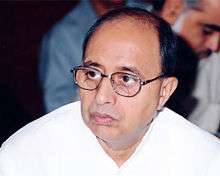Laxmi Chand Tyagi
| Laxmi Chand Tyagi | |
|---|---|
 | |
| Born |
Laxmi Chand Tyagi Vaira Firojpur |
| Died |
27 July 2005 (aged 60) Ahmedabad |
| Nationality | Indian |
Laxmi Chand Tyagi (Devanāgarī:लक्ष्मी चाँद त्यागी;1 January 1945 – 27 July 2005), known as LC, was an Indian agriculturalist, social leader, and founder of GRAVIS.
Early life
Born in the village of Vaira Firojpur, Bulandshahar, Uttar Pradesh, in 1945, Tyagi was influenced by the philosophies of Mohandas Karam Chand Gandhi and Vinoba Bhave in his college years. After completing a master's degree in Agriculture at Agra University in 1967, he joined the Bhoodan-Gramdan mission of Vinoba Bhave. It was at that point that he began to embody his personal philosophies by changing his attire from machine-made linens to the Khadi promoted by Gandhi and devoting his life to the betterment of the underprivileged classes of India.
Career
Laxmi Tyagi completed a post-graduate qualification in Agricultural Science from Agra University in 1967. After marrying in 1967, Tyagi spend the next ten years managing village development projects in Uttar Pradesh. For seven of those years, he served as a Programmes Head for a grass-roots-based organisation at Govindpur in the north-Indian state of UttarP. Before that, he worked for famine relief in Bihar for two years, the East Indian State, in the leadership of Jay Prakash Narayan. He then moved to Uttarakhand to develop a four-district employment program for the Government of India. With success there, he became a governing board member of various organisations at a young age.
In 1983, after having worked in Jodhpur for three years, Tyagi saw a desperate need for social change and progressive thought in the rural areas of the Thar Desert. At the request of his mentor Acharya Kriplani, Tyagi began a rural development experiment in a small village. The organisation founded by him is known as GRAVIS and is one of the leading NGOs in India working for rural development. Tyagi made deep-rooted contacts with the rural communities and proposed pioneering initiatives in the spheres of water security, food security, education and health care. GRAVIS is an organisation with widespread interventions on health care, water and food security and education, and with well established national and global reputations. The initiatives led by him reached over 50,000 households and gave birth to a number of organisations working at the grass-roots level. GRAVIS, his creation, is currently led by his son Prakash Tyagi.
During his public life, he contributed to many social movements across India and supported a large number of development activists and small-scale groups working at the grass roots. He represented various governing bodies and advisory councils of a number of governmental and non-governmental organisations, research committees and evaluation missions. During his life, he also extensively travelled globally for exchange of ideas and knowledge and spoke in numerous international gatherings.
Tyagi possessed an ability of understanding people's wisdom and blending it with science. During his life, he wrote numerous books, reports and articles focusing on community-based development. He was an articulate and passionate speaker on issues related to development and poverty alleviation.
Personal life
Living by his principles, even when in opposition, he was a supporter of women's rights, horizontal stratification of social class, and the right of choice against archaic propriety. Coming from a well-off family background, Tyagi had decided to leave his paternal property in his early 20s and to settle for a life dedicated to people's empowerment in most needy and challenging parts of the country.
He was married to Shashi Tyagi, a student of education, and father to Abha and Prakash Tyagi. Both his children are medical doctors.
In his daily life, he adopted the khadi dress of Gandhi and had a passion for active participation in his endeavours. He is remembered for working in the fields, despite injury, every day until midday and equal separation of household and community duties. Approachable by nature, many of his successes can be attributed to the trust and rapport he established with the people he was trying to help. With his devotion and self-less life, he won many friends all over the world. "Let us leave no stones unturned"was his favourite quote when it came to working with the community. With growing stature of his work, he always kept distance from publicity and awards. He always believed in the fact that making change in people's lives and seeing them first-hand is the most satisfying award.
In his honour, his family, friends and GRAVIS have started L. C. Tyagi Fellowship Awards to promote higher education among rural youth, especially among backward sections of the community and for girls and women. The L. C. Tyagi Fellowship Award is administered through L. C. Tyagi Memorial Trust and an advisory council. The Trust is looking to set up new educational and medical facilities in coming years to reach the unreached populations.
Death
He died of a renal failure in Ahmedabad, Gujarat, on 27 July 2005. Over 20,000 friends and supporters came to pay him last tributes in his funeral in Jodhpur, India. After his death, the work of GRAVIS continues with same dedication following his ideology, and has expanded significantly in the leadership of his son Prakash, reaching over one million people.
Bibliography
- Remembering You: GRAVIS, Jodhpur, Rajasthan, India: July 2006